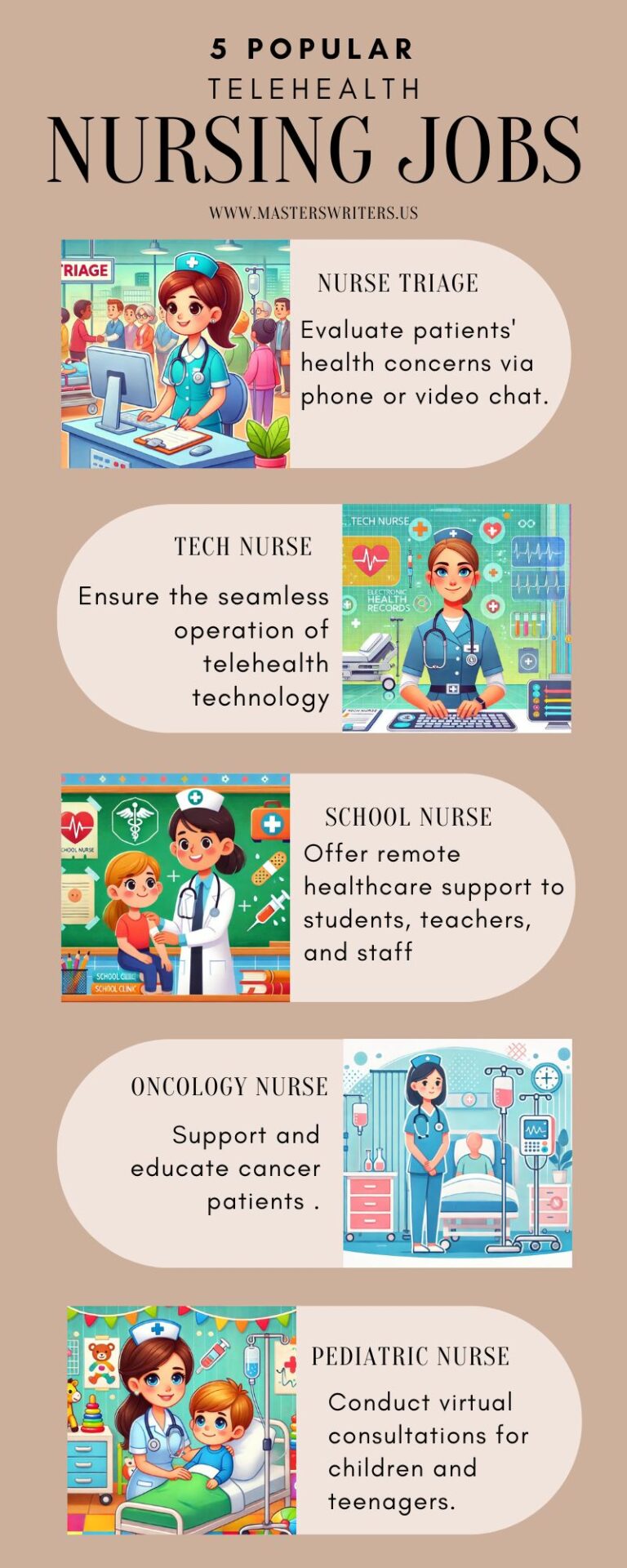Nursing
Telehealth Nursing: What is a Telehealth Nurse


In today’s fast-paced world, the healthcare landscape is rapidly evolving, and one of the most significant advancements is the integration of telehealth nursing. Telehealth nursing leverages technology to provide remote care, making healthcare more accessible and efficient. This approach not only expands the reach of medical services but also offers convenience to both patients and healthcare providers.
This comprehensive guide explores various aspects of telehealth nursing, including what it entails, the steps to become a telehealth nurse, the essential skills required, typical responsibilities and duties, work environments, career benefits, job opportunities, salary expectations, and frequently asked questions. Whether you are considering a career in telehealth nursing or are simply curious about this innovative field, this article will provide valuable insights into telehealth nursing.
Keep reading to learn more about this evolving profession. If you’re struggling with coursework, you can get nursing research paper help from our expert services.
What is Telehealth Nursing
Telehealth nursing involves the delivery of nursing care and services through digital communication technologies, such as video conferencing, phone calls, and mobile apps. This practice enables nurses to monitor patients remotely, provide education, conduct assessments, and offer consultations, ensuring continuous and accessible healthcare. By utilizing telehealth, nurses can efficiently manage patient care across diverse geographic locations, improving health outcomes and expanding the reach of healthcare services.

Nursing School Got You Drained?
Focus on your studies; we’ll handle the nursing essays. Get expert help, and stress less!
How to Become a Telehealth Nurse - Key Steps
Embarking on a career as a telehealth nurse begins with a robust nursing education foundation. Here’s a step-by-step guide to help you on your journey:

- Earn Your Nursing Degree:
- Choose Your Path: Aspiring telehealth nurses can pursue either an Associate Degree in Nursing (ADN), which typically takes two years, or a Bachelor of Science in Nursing (BSN), a four-year program. Decide which option best fits your career goals and educational background. If you already hold an ADN, consider an RN-to-BSN bridge program to complete your BSN more quickly.
- Select Accredited Programs: Ensure your chosen program is accredited by a recognized organization to qualify for the NCLEX-RN exam and future licensure.
- Explore and Apply: Research various nursing programs to find one that suits your learning style and career objectives. Complete the application process and fulfill all admission requirements.
- Complete Coursework and Clinicals: Your nursing education will combine theoretical knowledge with practical experience through clinical rotations in different healthcare environments.
- Pass the National Council Licensure Examination (NCLEX-RN):
- Achieve Licensure: The NCLEX-RN is a standardized test that evaluates your readiness to practice as a registered nurse. Passing this exam is essential for obtaining your nursing license in the U.S.
- Prepare for the Exam: Utilize available resources, such as study guides and practice tests, to prepare thoroughly for the NCLEX-RN.
- Gain Clinical Experience:
- Build a Solid Foundation: Although there’s no specific certification for telehealth nursing, employers often prefer candidates with hands-on experience as a registered nurse (RN) in a traditional setting.
- Begin with Entry-Level Positions: New graduates can gain experience by working in entry-level R.N. roles, such as those in hospital medical/surgical units.
- Seek Relevant Experience: Consider volunteering or internships in healthcare facilities that use telehealth technology. This experience will enhance your practical skills and technical proficiency.
- Develop Technical Skills: Proficiency with technology is crucial for telehealth nurses. Focus on building strong computer skills and the ability to troubleshoot basic technical issues.
What Skills Are Most Important for a Telehealth Nurse?
While a solid educational foundation is crucial, excelling in telehealth nursing requires a unique set of skills. Here are some of the most important ones to develop:
Exceptional Communication: Telehealth nurses must excel in clear and effective communication. Strong verbal skills, active listening, and the ability to build rapport remotely are essential. You need to convey complex medical information in a simple, understandable way to ensure patient trust and engagement through a digital medium.
Critical Thinking and Problem-Solving: Without physical examinations, telehealth nurses must rely on critical thinking. Analyzing patient reports, symptoms, and histories is crucial for accurate assessment and decision-making. Being resourceful and skilled in problem-solving helps in addressing unexpected challenges in a virtual setting.
Technological Proficiency: Competence with technology is fundamental in telehealth. Nurses need to be comfortable using various digital tools such as video conferencing platforms, electronic health records (EHRs), and communication apps. The ability to navigate these systems efficiently and resolve basic technical issues is crucial for smooth patient interactions.
Empathy and Patient Education: Even in a virtual environment, building strong patient relationships is vital. Telehealth nurses must show empathy and understanding and be dedicated to patient education. Tailoring communication to ensure patients feel comfortable, informed, and involved in their care plan is vital.
Adaptability and Time Management: The field of telehealth is continuously evolving. Nurses must be adaptable, embracing new technologies and healthcare models. Strong time management skills are also crucial for managing efficient virtual consultations and handling diverse caseloads.
Telenursing Responsibilities and Duties
Role 🏥 | Description 📄 |
Evaluating and Prioritizing Patient Needs | A telehealth nurse uses video calls, phone consultations, and patient records to understand symptoms and medical history. They decide if self-care, a doctor’s visit, or urgent care is best. |
Managing Chronic Conditions | Nurses help patients with ongoing health issues like diabetes and heart disease. They use telehealth devices to monitor vital signs, advise on medications, teach self-care, and offer emotional support. |
Educating and Counseling Patients | Nurses explain diagnoses, treatments, and medications clearly. They provide counseling and support to help patients take part in their healthcare. |
Working Together with Other Healthcare Professionals | Telehealth nurses collaborate closely with doctors and care teams. They use electronic health records to share patient information and plan appointments and follow-ups. |
Utilizing Technology Effectively | Telehealth nurses are skilled in using video calls, electronic records, and secure tools for consulting with other healthcare professionals and managing patient data. |
Where Does a Telehealth Nurse Work?
Location | Description |
Home Offices | Many work from the comfort and convenience of a dedicated home office. This allows for a good work-life balance and eliminates the need for commuting. |
Telehealth Call Centers | Some work in centralized call centers equipped with the necessary technology for virtual consultations. This environment fosters collaboration with other telehealth professionals and provides access to immediate support from supervisors. |
Hospitals and Clinics | Hospitals and clinics are increasingly integrating telehealth services into their patient care models. Telehealth nurses working in these settings might dedicate a portion of their time to virtual consultations alongside their traditional in-person duties. |
Independent Contractor Roles | Those with an entrepreneurial spirit can explore opportunities as independent contractors. This path offers maximum flexibility but may require additional business management skills. |
Why Become a Telehealth Nurse?
Pursuing a career in telehealth nursing offers a unique blend of benefits and challenges. This field can be highly rewarding, but it also comes with its own set of considerations. Here’s a detailed look at the pros and cons to help you determine if telehealth nursing aligns with your career goals:
Pros
Aspect | Details |
Flexibility and Work-Life Balance | Telehealth nursing offers a high degree of scheduling flexibility, promoting a better work-life balance. |
Technology and Innovation | Telehealth nurses work with advanced technologies, staying at the forefront of healthcare innovation. |
Diverse Patient Population | This field allows nurses to interact with patients from various geographic and demographic backgrounds, removing barriers to care. |
Reduced Risk of Exposure | Telehealth nursing minimizes exposure to contagious diseases, enhancing personal safety. |
Growth Potential | The telehealth sector is expected to grow significantly, providing numerous job opportunities and a promising career path. |
Cons
Aspect | Details |
Limited Physical Interaction | Nurses who prefer hands-on patient care might find the lack of physical interaction challenging. |
Reimbursement and Payment Models | The evolving nature of telehealth reimbursement can result in varying compensation compared to traditional roles. |
Technology Dependence | Dependence on technology requires nurses to handle technical issues and maintain stable internet connections. |
Telehealth Nursing Jobs
Telehealth nursing offers a wide array of job opportunities, emphasizing flexibility, innovation, and growth. These roles present a rewarding future for nurses looking to transform patient care through digital means.

- Nurse Triage: Evaluate patients’ health concerns via phone or video chat, determine the urgency of care, and guide them to the appropriate next steps.
- Chronic Disease Management Nurse: Provide support for patients with chronic conditions like diabetes or heart disease through remote monitoring, medication guidance, and self-care education.
- Psychiatric Nurse: Deliver mental health consultations, therapy sessions, and emotional support remotely.
- Nurse Educator: Create and deliver educational content for patients on various health topics through online platforms.
- Tech Nurse: Ensure the seamless operation of telehealth technology, troubleshoot technical issues, and manage electronic health records.
- School Nurse: Offer remote healthcare support to students, teachers, and staff within educational institutions.
- Hospice and Palliative Care Nurse: Provide emotional support, symptom management guidance, and end-of-life care education to patients and their families remotely.
- Dermatology Nurse: Conduct virtual consultations to diagnose and manage skin conditions, recommending appropriate treatment plans.
- Wound Care Nurse: Oversee chronic wound care remotely, instruct patients on proper wound care techniques, and coordinate follow-up care with physicians.
- Cardiac Nurse: Assist cardiologists with remote patient monitoring, medication management, and education for heart-related conditions.
- Ophthalmic Nurse: Provide preoperative and postoperative care for eye procedures through virtual consultations.
- Oncology Nurse: Support and educate cancer patients remotely, manage side effects, and coordinate care plans with oncologists.
- Pediatric Nurse: Conduct virtual consultations for children and teenagers, guide common childhood illnesses, and address parents’ concerns.
- Women’s Health Nurse: Offer remote consultations for women’s health issues, provide prenatal education, and manage contraception needs.
- Preoperative Nurse: Conduct virtual assessments prior to surgery, educate patients on surgical procedures, and answer any pre-surgery questions.
Telehealth Nursing Salary
Telehealth nursing offers a wide range of career opportunities for nurses at different stages of their professional journeys, including Licensed Practical Nurses (LPNs), Registered Nurses (RNs), and Advanced Practice Registered Nurses (APRNs).
When considering the earning potential for telehealth nurses, it’s essential to recognize that salaries can vary widely. According to Payscale data from July 2022, the average annual salary for a telehealth nurse is approximately $62,930, equating to about $31.30 per hour.
Several factors can influence these salary figures:
- Experience Level: Nurses with extensive experience in telehealth or traditional nursing settings generally earn higher salaries.
- Qualifications: APRNs with advanced qualifications and specialized certifications often have greater earning potential.
- Geographic Location: Nurses working in regions with a higher cost of living typically receive higher salaries compared to those in lower-cost areas.
- Employer Type: Salaries can also vary based on the employer, with some hospitals, healthcare systems, or telehealth companies offering higher pay or additional benefits packages.
- Specialty Area: The specific telehealth specialty a nurse works in can also impact salary levels.
Overall, telehealth nursing remains a competitive and rewarding field with opportunities for career growth and financial stability.
Final Remarks
Telehealth nursing represents a transformative shift in healthcare delivery, offering numerous benefits for both patients and healthcare providers. As technology continues to evolve, the demand for skilled telehealth nurses is expected to grow, making it a promising and dynamic career choice. With the ability to provide care remotely, telehealth nurses play a crucial role in expanding access to healthcare, especially in underserved and remote areas. Whether you are a seasoned nurse looking to transition into telehealth or a newcomer considering this path, the opportunities in telehealth nursing are vast and rewarding. By staying informed and continuously developing your skills, you can thrive in this innovative and impactful field, contributing to the future of healthcare.

Want a Nursing Career with More Freedom?
Telehealth lets you be a nurse on your terms. We’ll handle the paperwork!
FAQs
What does telehealth nursing do?
Telehealth nursing involves using digital communication technologies to deliver nursing care remotely. Telehealth nurses conduct patient assessments, provide education, manage chronic conditions, offer consultations, and monitor patients’ health status through video calls, phone calls, and mobile apps, ensuring patients receive continuous and accessible care regardless of their location.
Is telehealth nursing hard?
Telehealth nursing can be challenging as it requires strong communication skills, proficiency with technology, and the ability to make clinical decisions without in-person interaction. However, many nurses find it rewarding due to its flexibility, the opportunity to work with a diverse patient population, and the ability to provide essential healthcare services to those who might otherwise have limited access.
How much do telehealth nurses make in the U.S.?
The average salary for telehealth nurses in the U.S. is approximately $62,930 per year, which translates to around $31.30 per hour, according to Payscale data from July 2022. Salaries can vary based on experience, qualifications, geographic location, employer type, and the specific telehealth specialty.
What are the 4 P's of telehealth nursing?
The 4 P’s of telehealth nursing are:
- Patients: The focus is on providing patient-centered care and ensuring accessibility and continuity of care.
- Providers: Healthcare providers, including nurses, must be trained and proficient in using telehealth technologies to deliver effective care.
- Processes: Implementing efficient workflows and protocols to streamline telehealth services and ensure quality care.
- Performance: Monitoring and evaluating the effectiveness of telehealth services to improve patient outcomes and satisfaction continually.
Sources
Nurse Journal. How Much Do Telehealth Nurses Make? https://nursejournal.org/careers/telehealth-nurse/salary/
Gaines, K. (2023). How to Become a Telehealth Nurse. Nurse.org. https://nurse.org/resources/telehealth-nurse/

